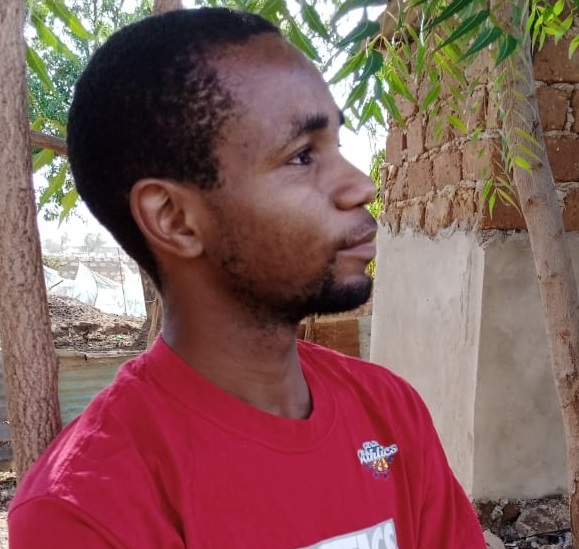With love you wept
With the cross you crept
Crying all the way to Calvary
To shame the devil the rivalry
With love, just for me
Jailed
Nailed
Just for me, with love
Everything I drive myself
To strive so hard to love you back
The same way you loved me
If one day oh Savior, my pride grows than my love for you, remind me because of the cross am alive
Humbly you followed
Silent and so dumb
Because you were the lamb
From heaven you came
You healed the lame
Deaf, sick and blind
Blinded by money they were
Oh Christ
Save us from lust
We are dust
Remind us that
The ultimate price you paid
Your precious blood shed
If a day will come Christ, my lust for money will grow than my love for you, remind me from dust I came, you are Christ my savior
You came to overcome
The devil you overcame
Death you overcame
You overcame the world
Took all the Glory
Not measures in a lorry
Many more to make you shine just in line with Daddy
Overcomer
Plumber
My situation you fix
If one day oh Sweet Jesus my life situation makes me forget about you, remind me you overcame what no man can overcome
On the third day you rose
Just like predicted
By those directed
And inspired
Hallelujah mother Mary sung
Happy for the risen son
Hallelujah Peter praised
For the shamed Lucifer
Hallelujah the world sung
You rose
You shined
Brought hope
If one day precious Teacher, I will find no joy in praying again, remind me of the great moment the world praised your name, so I can praise too
At times I win
I forget Christ
Am dust
At times I forget to pray
Judge me Savior, but not in anger lest you bring me to nothing

Poem written by
Elizabeth Khasiro Munuya
First Year Student
(Pursuing a Bachelor’s Degree in Arts)
University of Nairobi- (Main Campus)
Why bygones be bygones as the adage goes?
I sat by the river side as page by page the past from my memory flows
I picked a pebble and tossed into the air and left it fall back into the waters
Slowly I rose up and billow back home.
Pride still eating my inside, I tried my best but nothing morphed
I felt that there was this one thing which to fully grasp I tried
My thoughts making infinite loops about resurrection, tired!
Maybe a brothel was safer than visiting my mind, so sad!
The day of redemption reached.
Finally, after flipping for long my mind came across Easter, from loss we gained!
Free got set the chained
Many Easter days like today had come but still I remained empty that the grave was empty!
But this I will resurrect with Christ
My heart is going to speak.
I want to go against my norms and come out my cocoons,
My quest for freedom confused me even more.
The more I dug into knowing, the more I added pain into the sore!
What toil?
Finding meaning in this meaningless life!
It’s like jumping into the fire from the boiling oil!
The fool and the wise BOTH experiencing death! Where is the meaning of wisdom?
After doing good all his life, the only gratitude he got was the wrath of a ‘ knife’
That night he prayed, trying to rearrange the plan, imagining the pain about to stream!
Unfortunately, only God had the mandate to take away or retain the ‘cup’ for him.
All is vanity! The writer of Ecclesiastes emphasized all through the book.
The bloody day reached, and a kiss gave him away!
“He is a blasphemer!” They said
The savior was crucified with two thieves! Once again where is the difference? Stray
Stray I’m, a well lived life, ending in mockery and merciless whips. Stay…
Longer I wanted him stay, but the world their own they had to betray!
A thug humble enough found his way to paradise
SILENCE! SILENCE! SILENCE!
Darkness became the cover of the world for a moment, the curtains were torn!
His body succumbed to the pain, and it was over, arcane but a seed was sown.
Descended into the deepest darkness and Satan was left in fetters
Key taken new light was shone into the world as the messiah arose!
Impossibility made possible, the rose
Had to bloom once more as we got the prize of freedom! He arose!
Vanity still ringing in my mind but this time it’s no longer a mystery but great understanding
The wise and the fool are now totally different, they both die but the latter is assured of resurrection!

Poem written by
Lennox Kanyoe Kahati
Second Year Student
(Pursuing a Degree in Electrical Engineering)
University of Nairobi (Main Campus)
POEM ON CALVARY
Lord, I can hear you calling,
I can see the affection, the compassion in your eyes,
I can still hear your forsaken cries, the voice of you calling,
Lord, I know I can fathom less of your form,
But I know you want the best for me,
Lord, I can still hear their voices “crucify him”
At the last moment on Calvary –
You could still heal, the blind could see,
Your power was in you, because you are the power,
Lord I can fathom the pain, the agony,
The pain that I deserved-
That you took away,
And brought me salvation,
You gave me a chance,
To feel your presence again,
You brought me
From the abyss of darkness,
To a world of Light, the city of light
Lord, I stand firm in you,
To not let you shed blood in vain,
Lord, as we reckon your pain and sacrifice,
Give us renewal,
Give us the strength, health and courage
To combat the pandemic that still lurks in the world

Poem written by
Ken Moses Thimba
First Year Student (2021)
(Pursuing a Degree in Quantity Survey)
University of Nairobi (Main Campus)
In Japan, the elevator apologizes for keeping you waiting: is our work ethic comparable
From different online dictionaries, work ethics is defined loosely as “work as a moral good”, “determination to work hard” and such others. Oxford dictionary states it as “the principle that hard work is intrinsically virtuous or worthy of reward”. The key point being work without which the principle falls.
Where there’s life, there’s work to be done, literally.
Why do we work? I mean really, Why! Well, if you ask many Christians, they will tell you it is someone’s fault. Following the account on Genesis, Adam, and his partner (humanity super champs) ate the apple (the fruit of the tree in the middle of the garden) and from this, we all have to work.
The historical account of creation gives details that are pertinent to this discourse. God did miraculous works for starters, creating time and space from its main ingredients (read this as creating it from nothing) and then an elaborate scheme of putting the eco-system in place with days, seasons, seeds, and seedbearing fruits and all living creatures. After which he creates man, after his own image, to perform a unique task while multiply and fill the earth and have dominion over the creation.
If that does not spell work for anyone, nothing will… or is there? In Genesis 2, it turns out there is more. In the recount, the records start with God blessing the Sabbath because God rested from all his work. At this point, it is safe to say that the creation job is complete. However, the account goes further and says, no plant had sprung up grown, reason being, “for the Lord God had not caused it to rain on the land, and there was no man to work the ground” Gen 2.5.
A few moments later, on the same account, God took the man he had created and put him in the garden of Eden to work it and keep it. Just like that, poor thing, he did not even get to be legal age if we follow this drift.
All that to say, work comes first. Yes, the curse introduced some hostile work dynamics and made it much more severe but no, we do not work because someone ate the forbidden fruit. Work precedes the commandment not to eat the fruit, in other words, verse 15 comes before verse 17. Man was not cursed with work! The ground was cursed, to produce thorns and thistles, and requiring heavy and painful toils from man.
Work is life, or so they say. Think about it, what would we all be doing right this minute if not working. In and besides life, work is the most important thing. Every wakeful moment is a working moment, it may not be that apparent but something in you somewhere is always working. An eye, an ear, a heart, or maybe the mind, not to mention the millions of cells that work tirelessly to keep you afloat.
In the wake of the 21st century, the truth of this is known by all though less heeded. WHO and other agencies have warned against sedentary lifestyles as it’s proven to increase causes of mortality, risk of cardiovascular diseases, diabetes, and obesity, among others (WHO, 2002). If anyone deliberately decides to not use any of their extremities, like a hand, for example, scientists have it that Osteoporosis (bone weakening) and muscle atrophy will visit sooner than later. It is like the whole body system is rigged to make us work, and get bent out of shape if we don’t.
On a more conventional understanding, we take work to be intentional and deliberate. The good news is, even in the other front of leisure and relaxations, work is necessary. Try planning for a family vacation, a time for not working, and see how quickly work shows up, uninvited. It is therefore not a question of working or not, it is how much we will invest ourselves in it. How committed we ought to be, how accountable to the task at hand. Herein comes work ethics.
God commands us to work, work for him
The bible is replete with indicatives and implicit commands to work. As earlier mentioned, God formed man in his own image and laid a heavy mandate on man to propagate the creation order, in being fruitful and having dominion on the established systems.
We always have this notion of heaven as being a place of eternal bliss marred with gaudy worklessness. To some of us (I know I struggled with this), we often run into difficulties when we read in the bible that God is working. An almighty God who speaks things into existence is working? Doing what, we ask! Well, to put it in context, Jesus had healed a man on the Sabbath, and the Jews were fairly unimpressed, to put it mildly, for the transgression of the holy day. On this account, he said, “My Father is working until now” or a more expressive KJV, “My Father worketh hitherto, and I work” John 5.17. The simple fact is God is working, to this day! The extent of the work ranging from the sustenance of the entire world, bestowing his benevolence on humanity, to remitting justice and condemnations.
From the passage and several others, God is always working, the question for us is this, how do we relate with a God who works, by lazing around and waiting for him to miraculously place bread in our hands? Luckily, we do not have to worry about what to do because the bible is not silent on our duties. Simply put, God has ordained work and blessed us with such for our good and satisfaction.
The attitude of the bible is clear. God blessing the work of our hands, whatever one sows that will he also reap, if a man will not work, let him not eat, this and such like portions of the word of God attest to it. To me, the most sweeping address to work and work ethics to be found in the scripture is captured by this mashup ”whatever you do, work heartily, as for the Lord and not for men; for it is God who is at work in you, both to will and to work for His good pleasure” Colossians 3.23 and Philippians 2.13.
A story is told of a passerby priest and a gardener in some ‘desert’ party of the world. “God has blessed you with a very lovely garden,” said the priest, “Yeah, he surely has…” said the gardener, “But you should have seen it when he had it all to himself”, he added as the priest parted to proceed to a local church congregation. The moral of the story is, ladies and gentlemen, ‘green-alize’ your gardens as to the Lord not to men as he gives you the strength.
Japan in context.
In Japan, everything is punctual. Have you heard of the story of a 64-year-old waterworks bureau worker who was fined heavily because he took a lunch break three minutes earlier on 26 occasions over a period of seven months (Yonette and Inoue, 2018)? How about train companies apologizing to the commuters for being 1 minute late? The culture values time to the core and in the engagement, everyone strives to do their job without dropping the ball. And yes, the system does have some challenges on work-related pressure but that is for another day.
In as many places as there are human interactions in Japan, you can be sure the statement お待たせいたしました is being used, particularly when dealing with formal service delivery. Omatase itashimashita (お待たせいたしました) is the golden word for a plethora of meaning ranging from “Thank you for waiting/accepting to wait”, to “We apologize for the delay” despite the waiting duration. Case in point, when you are in a multistory building and you press the elevator hailing button and the elevator takes an extra minute to attend to you, you can be sure the elevator will apologize for keeping you waiting. What drives such micro-level esteem of the user’s time if not deep respect of the individual and the business that brought him/her to the building.
The fact that Japan has one of the strictest punctuality rules is widely known. Another fact is that they have the highest life expectancy in the world (Tsugane, 2020). In my opinion, the culture of work is deeply engrained into a greater majority. And is reflected in a healthy diet, regular physical activity, extended work years and government policies. In an article describing the relationship between work and dexterity, officials say they are unsure whether the people continue to work, way past retirement, because they are healthy or they are healthy because they continue working (Spitzer, 2014).
And to clarify, the work we are talking about here is not limited to a job or formal employment. A healthy diet is one of the reasons that has been offered by scientists for lengthy days. And we all know how laborious eating healthy is. But that is not all there is. I once did visit an attraction site (Tokyo Disney land to be specific) with some friends. It is was a fun experience beyond what these ‘inky’ letters can convey. The amusing thing is that the day turned out to be more than I bargained for. My Japanese friends wanted to pick as many activities as is humanly possible. We arrived at the scene before daybreak and run (more like marathoning) from one site to the next, by noon all my energy reserve were gone. Witnessing Tokyo Disney resort staff working hard to contain the enthusiastic fans from overrunning each other in a mad rush was a scene to behold. It is like there’s no casual, laidback activities around this side of the world, not to mention the neck-breaking speed of eating hot ramen. It is no wonder, Karoshi – “death from overwork” does exist in the country (Lane, 2017).
When did the rain swallow us whole like Jonah, let alone start beating us?
The atrocities that occur in this country (Kenya) that are work-related are beyond comprehension. The work ethos of our country is dire, to say the least, in a country where more than 70% of the populace are Christians. Hundreds of lives lost through people’s negligence, the dams that erupt killing hundreds and leaving thousands of families devastated. The deaths due to predictable floods, heavy rains, and mudslides. The droughts take away lives year in year out, and we know when and where it will happen, not if. The annual massacre of innocent people on our roads owing to reckless driving. The electoral violence instigated by political despotism wounds the heart of the nation. This and many others whether we like it or not point to one thing, poor work ethics; people not simply doing their jobs or not doing it well enough.
Job 12.5 puts it this way, in the thought of one who is at ease there is contempt for misfortune; it is ready for those whose feet slip. It is possible that you and I have not been a recipient of the misfortunes described above but a cavalier attitude, contempt for the misfortunes of other countrymen, which is simply consequences of lack of ethics in others, is not a Christian perspective. I know the attitude I have had on several occasions; it is the work of the government to do blah blah… pointy fingers! We are witnessing a byproduct of the work that was put in place yesterday, the fruits of yester plants. What do we expect when teacher-parent-pupil work together to cheat in exams? Or when unworthy, corrupt leader misappropriate welfare funds? Or a family chef who does not strive for quality in the homemade dish for his/her family?
The truth is, we all have a part to play. Akin to what a modern psychologist Prof. Jordan Peterson outs it, clean up your room before solving more complex world problems, we have work to do as a country. More so those that are called to be Christ-like, Or the words of St. Jesus will offer no consolation, but a stern reprove when he says, “Why do you look at the speck of sawdust in your brother’s eye and pay no attention to the plank in your own eye? 4 How can you say to your brother, ‘Let me take the speck out of your eye,’ when all the time there is a plank in your own eye? 5 You hypocrite, first take the plank out of your own eye, and then you will see clearly to remove the speck from your brother’s eye.” Matt 7: 3-5.
References:
- World Health Organization. “Physical inactivity a leading cause of disease and disability, warns WHO.”, (2002, April 4). Retrieved from https://www.who.int/news/item/04-04-2002-physical-inactivity-a-leading-cause-of-disease-and-disability-warns-who#:~:text=Sedentary%20lifestyles%20increase%20all%20causes,lipid%20disorders%2C%20depression%20and%20anxiety.
- Spitzer, K., “Secrets From the Longest-Living Place on Earth”, AARP Bulletin, May 2014 Retrieved from https://www.aarp.org/health/healthy-living/info-2014/longevity-secrets-from-japan.html#:~:text=A%20healthy%20diet%2C%20regular%20physical,the%20longest%20in%20the%20world.
- Tsugane, S. Why has Japan become the world’s most long-lived country: insights from a food and nutrition perspective. Eur J Clin Nutr(2020). https://doi.org/10.1038/s41430-020-0677-5
- Yonette J. and Inoue, M., “He Left Work for 3 Minutes Before His Lunch Break. Now His Pay Is Docked.”, NY Times, June 2018. Retrieved from https://www.nytimes.com/2018/06/22/world/asia/japan-bento-lunch-early.html
- Lane, E., “The young Japanese working themselves to death”, BBC World Service, June 2017. Retrieved from https://www.bbc.com/news/business-39981997


